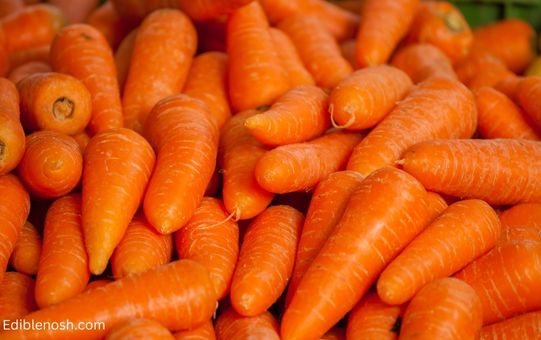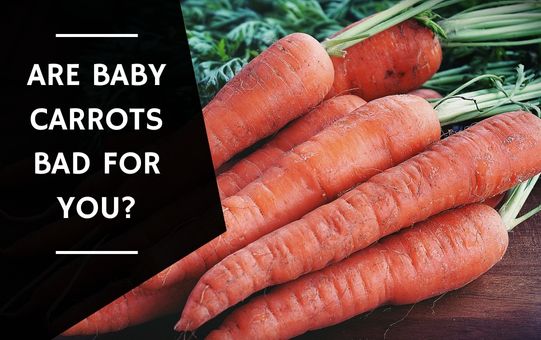Are Baby Carrots Bad For You? You may have heard that baby carrots are less nutritious than regular carrots or are “bad” for you.
No, baby carrots are nutritious. In fact, they are a convenient and nutrient-rich snack that is rich in vitamin A and dietary fiber. Baby carrots are not genetically modified or treated with harmful chemicals, and they contain the same amount of sugar and nutrients as regular carrots.
Learn the truth about this popular snack food and whether baby carrots should be added to your diet.
Contents
- Why is baby carrot bad for your matter?
- What are baby carrots?
- Do baby carrots have fewer nutrients than regular carrots?
- Is it true that baby carrots are soaked in chlorine?
- Do baby carrots have more sugar than regular carrots?
- Is it better to eat regular carrots instead of baby carrots?
- How are baby carrots made?
- Are baby carrots less filling than regular carrots?
- Can baby carrots cause digestive problems?
- How should baby carrots be stored?
- Can baby carrots be cooked or baked?
- Final Thought
- FAQs | Are Baby Carrots Bad for You
Why is baby carrot bad for your matter?
It is not accurate to say that baby carrots are bad for your health. In fact, baby carrots are a convenient and nutritious snack option that is high in vitamins and minerals, including vitamin A and dietary fiber.
They are not genetically modified or treated with any harmful chemicals, and they do not have more sugar or fewer nutrients than regular carrots.
There is a common misconception that baby carrots are soaked in chlorine or other harmful chemicals, but this is not true.
Some baby carrots are treated with a mild disinfectant solution to reduce the risk of bacteria and other contaminants, but this is a standard practice in the food industry and is not harmful to consumers.
In fact, the solution used on baby carrots is similar to the one used on fresh produce, such as lettuce and spinach, to keep them fresh and safe to eat.
Read Also: Are Carrots With Hummus Healthy?
What are baby carrots?
Baby carrots are simply smaller versions of regular carrots that have been peeled and cut down to size.
They are not genetically modified or treated with any special chemicals – they are just carrots that have been harvested earlier and processed to be more convenient for snacking.

Do baby carrots have fewer nutrients than regular carrots?
There is no evidence to suggest that baby carrots have fewer nutrients than regular carrots. In fact, both types of carrots are excellent sources of vitamins and minerals, including vitamin A, vitamin K, and potassium.
Carrots are also a good source of dietary fiber, which can help with digestion and weight management.
Is it true that baby carrots are soaked in chlorine?
It is not true that baby carrots are soaked in chlorine. Some baby carrots are treated with a mild disinfectant solution to reduce the risk of bacteria and other contaminants, but this is a standard practice in the food industry and is not harmful to consumers.
In fact, the solution used on baby carrots is similar to the one used on fresh produce, such as lettuce and spinach, to keep them fresh and safe to eat.
Do baby carrots have more sugar than regular carrots?
No, baby carrots do not have more sugar than regular carrots. In fact, both types of carrots have about the same amount of sugar – about 4 grams per 100 grams.
This is a relatively low amount of sugar, especially compared to other sweet snacks like candy or cookies.
Is it better to eat regular carrots instead of baby carrots?
There is no one-size-fits-all answer to this question. Both regular carrots and baby carrots can be part of a healthy diet, and the choice between the two ultimately comes down to personal preference.
Some people may prefer the convenience of baby carrots, while others may prefer the flavor and texture of regular carrots.
Ultimately, the most important thing is to eat a variety of fruits and vegetables, and both regular carrots and baby carrots can help you do that.
How are baby carrots made?
The process of making baby carrots involves harvesting full-size carrots at an earlier stage of growth when they are small and tender.
These carrots are then peeled and cut into small, bite-sized pieces using specialized machinery.
The baby carrots are then washed and disinfected to remove any dirt or contaminants, and packaged for distribution.
Are baby carrots less filling than regular carrots?
It is generally thought that larger, whole foods are more filling than smaller, processed foods. However, this is not necessarily the case with baby carrots versus regular carrots.
Both baby carrots and regular carrots are high in fiber, which can help with feelings of fullness and satiety. In addition, the size of the carrot is not the only factor that determines how filling a food is – the type and amount of nutrients it contains also play a role.
So while baby carrots may be smaller in size than regular carrots, they can still be just as filling and satisfying.
Can baby carrots cause digestive problems?
There is no evidence to suggest that baby carrots cause digestive problems any more than regular carrots do. In fact, both types of carrots are high in dietary fiber, which can help with digestion and prevent constipation.
However, as with any food, it is possible to eat too much of it and experience digestive discomfort. It is important to listen to your body and eat a balanced diet that includes a variety of fruits, vegetables, and other nutrients.
How should baby carrots be stored?
Baby carrots should be stored in the refrigerator to keep them fresh and crisp. They should be placed in a plastic bag or container with a damp paper towel to help them retain moisture.
Baby carrots can be stored in the refrigerator for about one week, although it is best to use them as soon as possible for maximum freshness.
Can baby carrots be cooked or baked?
Yes, baby carrots can be cooked or baked just like regular carrots. They can be roasted in the oven, grilled on the barbecue, or sautéed in a pan.
Baby carrots can also be added to soups, stews, and other dishes for added flavor and nutrition. Experiment with different cooking methods to find out which ones you like best!
Read Also: Are Carrots Better Raw Or Cooked?
Final Thought
Baby carrots are not “bad” for you. They are simply convenient and healthy snack options that can be enjoyed as part of a balanced diet.
While it is always best to eat whole, unprocessed foods whenever possible, baby carrots can be a convenient and nutritious alternative to other snack options. So go ahead and enjoy them – they are not bad for you at all!
FAQs | Are Baby Carrots Bad for You
Following are a few faqs related to are baby carrots bad for you?:
Do Baby Carrots Have Fewer Nutrients Than Regular Carrots?
There is no evidence to suggest that baby carrots have fewer nutrients than regular carrots.
In fact, both types of carrots are excellent sources of vitamins and minerals, including vitamin A, vitamin K, and potassium. Carrots are also a good source of dietary fiber, which can help with digestion and weight management.
Is It True That Baby Carrots Are Soaked In Chlorine?
It is not true that baby carrots are soaked in chlorine. Some baby carrots are treated with a mild disinfectant solution to reduce the risk of bacteria and other contaminants, but this is a standard practice in the food industry and is not harmful to consumers.
In fact, the solution used on baby carrots is similar to the one used on fresh produce, such as lettuce and spinach, to keep them fresh and safe to eat.
Do Baby Carrots Have More Sugar Than Regular Carrots?
No, baby carrots do not have more sugar than regular carrots. In fact, both types of carrots have about the same amount of sugar – about 4 grams per 100 grams.
This is a relatively low amount of sugar, especially compared to other sweet snacks like candy or cookies.
Is It Better To Eat Regular Carrots Instead Of Baby Carrots?
There is no one-size-fits-all answer to this question. Both regular carrots and baby carrots can be part of a healthy diet, and the choice between the two ultimately comes down to personal preference.
Some people may prefer the convenience of baby carrots, while others may prefer the flavor and texture of regular carrots.
Ultimately, the most important thing is to eat a variety of fruits and vegetables, and both regular carrots and baby carrots can help you do that.

